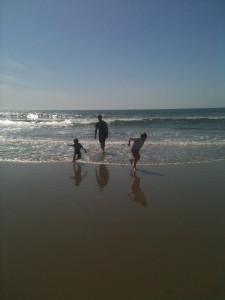 It seems that our culture is perpetually stuck in the stage of life called adolescence, and the corresponding mindset seems to be accelerating at an alarming rate. Like toddlerhood, adolescence is a developmental stage characterized by an all-consuming focus on me, which is certainly appropriate when you’re trying to figure out who you are. Adolescents, like toddlers, aren’t typically concerned with others, they believe that the world is their oyster, that they can have their cake and eat it, too, and their orientation is focused on getting instead of giving.
It seems that our culture is perpetually stuck in the stage of life called adolescence, and the corresponding mindset seems to be accelerating at an alarming rate. Like toddlerhood, adolescence is a developmental stage characterized by an all-consuming focus on me, which is certainly appropriate when you’re trying to figure out who you are. Adolescents, like toddlers, aren’t typically concerned with others, they believe that the world is their oyster, that they can have their cake and eat it, too, and their orientation is focused on getting instead of giving.
That’s fine when you’re actually a toddler or a teenager. The problem arises when these attitudes and behaviors continue into adulthood, and it becomes especially limiting when this mindset overflows into love relationships. You know you’re stuck in adolescent love when your experiences of love are informed by the following beliefs:
1. Adolescent love often begins with an all-consuming experience of falling in love. When you’re a teenager, you know you’re in love because you can’t eat, sleep, or think about anything or anyone else other than your beloved. Belief: If I don’t feel butterflies all the time then I’m not really in love and I’m with the wrong person.
2. Adolescent lovers often spend 24/7 together and pine with longing if one of them has to be away. Belief: If I don’t miss my partner when he/she is away, I don’t really love him/her and I’m with the wrong person.
3. Most adolescent lovers are glued at the hip, which is proof to yourself and others that you’re truly in love. Belief: If I want to spend time alone, it means we’re not really close and I’m with the wrong person.
Again, all of this is fine if you’re actually an adolescent. The problem is that this is the message we disseminate about love to full-fledged adults.
We’re stuck in an adolescent mindset in so many areas of the culture, but it could be said that none is so damaging is our view of love. For when we latch on to these childish beliefs, we run the risk of walking away from loving, well-matched partners because they fail to fit into our image of how love is supposed to be. As you can see above, all of the beliefs end with the conclusion that if your relationship doesn’t measure up to the expectation, you’re with the wrong person.
When are we going to grow up? When are we going to realize that love isn’t about living your life in someone else’s back pocket, that it’s okay, even healthy, to enjoy your separateness and not to be climbing the walls with longing every time your partner goes out of town? When is mainstream media going to start portraying adult, realistic relationships on the big screen and magazine covers instead of images that are more akin to teenage romance novels? Is it okay to base your philosophy about love and relationships on the characters of Sweet Valley High when you’re in your twenties, thirties, and beyond? I don’t think so.
I don’t blame individuals or families for our skewed belief systems and models of love; I blame our culture completely. And by culture I mean the philosophical foundation on which the notion of romantic love is predicated, a foundation that is then reflected in fairy tales, Western myths, and the media. (For an in-depth analysis of Western culture’s dysfunctional perspective on love and romance, please read “We” by Robert Johnson.) For I have plenty of clients who grew up witnessing firsthand through their parents what a healthy marriage looks like and they still fall prey to the pernicious and pervasive adolescent messages about love. These messages create wildly unrealistic expectations, which, when a real relationship fails to measure up, incite the thought, “There must be something wrong.”
This is so sad for everyone involved. It’s time to start telling our young people the truth. It’s time to present realistic images of healthy love on the big screen, in digital media, in novels, and in magazines. It’s time for our culture to grow up and recognize that real love isn’t about butterflies or two halves becoming whole together. It’s about two whole people who connect through shared values and vision choosing to commit to learning about what it means to give and receive love. It’s more about giving then getting; more about honoring each others’ separateness than merging into a symbiotic state of codependence; more about learning to fill your own well and from that place of fullness, offering your love to your partner.





